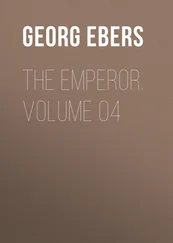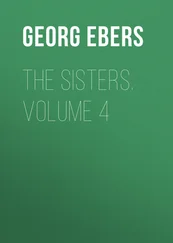Georg Ebers - The Bride of the Nile. Volume 10
Здесь есть возможность читать онлайн «Georg Ebers - The Bride of the Nile. Volume 10» — ознакомительный отрывок электронной книги совершенно бесплатно, а после прочтения отрывка купить полную версию. В некоторых случаях можно слушать аудио, скачать через торрент в формате fb2 и присутствует краткое содержание. Жанр: foreign_prose, literature_19, foreign_antique, на английском языке. Описание произведения, (предисловие) а так же отзывы посетителей доступны на портале библиотеки ЛибКат.
- Название:The Bride of the Nile. Volume 10
- Автор:
- Жанр:
- Год:неизвестен
- ISBN:нет данных
- Рейтинг книги:3 / 5. Голосов: 1
-
Избранное:Добавить в избранное
- Отзывы:
-
Ваша оценка:
- 60
- 1
- 2
- 3
- 4
- 5
The Bride of the Nile. Volume 10: краткое содержание, описание и аннотация
Предлагаем к чтению аннотацию, описание, краткое содержание или предисловие (зависит от того, что написал сам автор книги «The Bride of the Nile. Volume 10»). Если вы не нашли необходимую информацию о книге — напишите в комментариях, мы постараемся отыскать её.
The Bride of the Nile. Volume 10 — читать онлайн ознакомительный отрывок
Ниже представлен текст книги, разбитый по страницам. Система сохранения места последней прочитанной страницы, позволяет с удобством читать онлайн бесплатно книгу «The Bride of the Nile. Volume 10», без необходимости каждый раз заново искать на чём Вы остановились. Поставьте закладку, и сможете в любой момент перейти на страницу, на которой закончили чтение.
Интервал:
Закладка:
Georg Ebers
The Bride of the Nile – Volume 10
CHAPTER XIII
The Vekeel, like the Persian lovers, did not allow the heat of the day to interfere with his plans. He regarded the governor's house as his own; all he found there aroused, not merely his avarice, but his interest. His first object was to find some document which might justify his proceedings against Orion and the sequestration of his estates, in the eyes of the authorities at Medina.
Great schemes were brewing there; if the conspiracy against the Khaliff Omar should succeed, he had little to fear; and the greater the sum he could ere long forward to the new sovereign, the more surely he could count on his patronage—a sum exceeding, if possible, the largest which his predecessor had ever cast into the Khaliff's treasury.
He went from room to room with the curiosity and avidity of a child, touching everything, testing the softness of the pillows, peeping into scrolls which he did not understand, tossing them aside, smelling at the perfumes in the dead woman's rooms, and the medicines she had used. He showed his teeth with delight when he found in her trunks some costly jewels and gold coins, stuck the finest of her diamond rings on his finger, already covered with gems, and then eagerly searched every corner of the rooms which Orion had occupied.
His interpreter, who could read Greek, had to translate every document he found that did not contain verses. While he listened, he clawed and strummed on the young man's lyre and poured out the scented oil which Orion had been wont to use to smear it over his beard. In front of the bright silver mirror he could not cease from making faces.
To his great disgust he could find nothing among the hundred objects and trifles that lay about to justify suspicion, till, just as he was leaving the room, he noticed in a basket near the writing-table some discarded tablets. He at once pointed them out to the interpreter and, though there was but little to read on the Diptychon,—[Double writing-tablets, which folded together]—it seemed important to the negro for it ran as follows:
"Orion, the son of George, to Paula the daughter of Thomas!
"You have heard already that it is now impossible for me to assist in the rescue of the nuns. But do not misunderstand me. Your noble, and only too well-founded desire to lend succor to your fellow-believers would have sufficed. . ."
From this point the words written on the wax were carefully effaced, and hardly a letter was decipherable; indeed, there were so few lines that it seemed as though the letter had never been ended-which was the fact.
Though it gave the Vekeel no inculpating evidence against Orion it pointed to his connection with the guilty parties: Paula, doubtless, had been concerned in the scheme which had cost the lives of so many brave Moslems. The negro had learnt, through the money-changer at Fostat, that she was on terms of close intimacy with the Mukaukas' son and had entrusted her property to his stewardship. They must both be accused as accomplices in the deed, and the document proved Orion's knowledge of it, at any rate.
Plotinus, the bishop, at whose instigation the fugitives had been chased, could fill up what the damsel might choose to conceal.
He had started to follow the patriarch immediately after the pursuers had set out, and had only returned from Upper Egypt early on the previous day. On his arrival he had forwarded to the Vekeel two indictments brought against Orion by the prelate: the first relating to the evasion of the nuns; the other to the embezzlement of a costly emerald; the rightful property of the church. These accusations were what had encouraged the Negro to confiscate the young man's estate, particularly as the bitter tone of the patriarch's document sufficiently proved that in him he had found an ally.
Paula must next be placed in safe custody, and he had no doubt whatever that her statement would incriminate Orion in some degree. He would gladly have cross-examined her at once, but he had other matters in hand to-day.
The longest part of his task was ransacking the treasurer's office; Nilus himself had to conduct the search. Everything which he pointed out as a legal document, title-deed, contract for purchase or sale, revenue account or the like, was at once placed in oxcarts or on camels, with the large sums of gold and silver coin, and carried across the river under a strong escort. All the more antique deeds and the family archives, the Vekeel left untouched. He was indeed an indefatigable man, for although these details kept him busy the whole day, he allowed himself no rest nor did he once ask for the refreshment of food or a cooling draught. As the day went on he enquired again and again for the bishop, with increasing impatience and irritation. It would have been his part to wait on the patriarch, but who was Plotinus? Thin-skinned, like all up-starts in authority, he took the bishop's delay as an act of personal contumely. But the shepherd of the flock at Memphis was not a haughty prelate, but a very humble and pious minister. His superior, the patriarch, had entrusted him with an important mission to Amru or his lieutenant, and yet he could let the Vekeel wait in vain, and not even send him a message of explanation; in the afternoon, however, his old housekeeper dispatched the acolyte who was attached to his person to seek Philippus. Her master, a hale and vigorous man, had gone to bed by broad day-light a few hours after his return home, and had not again left it. He was hot and thirsty, and did not seem fully conscious of where he was or of what was happening.
Plotinus had always maintained that prayer was the Christian's best medicine; still, as his poor body had become alarmingly heated the old woman ventured to send for the physician; but the messenger came back saying that Philippus was absent on a journey. This was in fact the case: He had quitted Memphis in obedience to a letter from Haschim. The merchant's unfortunate son was not getting better. There seemed to be an injury to some internal organ, which threatened his life. The anxious father besought the leech, in whom he had the greatest confidence, to hasten to Djidda, there to examine the sufferer and undertake the case. At the same time he desired that Rustem should join him as soon as his health would permit.
This letter—which ended with greetings to Paula, for whose father he was making diligent search—agitated Philippus greatly. How could he leave Memphis at a time of such famine and sickness?—And Dame Joanna and her daughter!
On the other hand he was much drawn to get away on Paula's account—away, far away; and then how gladly would he do his best to save that fine old man's son. In spite of all this he would have remained, but that his old friend, quite unexpectedly, took Haschim's side of the question and implored him to make the journey. He would make it his business and his pleasure to take charge of the women in Rufinus' house; Philip's assistant could fill his place at the bedside of many of the sick, and the rest could die without him. Had not he himself said that there was no remedy for the disease? Again, Philip had said not long since that there could be no peace for him within reach of Paula: here was a favorable opportunity for escape without attracting remark, and at the same time for doing a work of the truest charity.
So Philippus had yielded, and had started on his journey with very mixed feelings.
Horapollo did not devote any particular attention to his personal comfort; but in one respect he took especial care of himself. He had great difficulty in walking and, as he loved to breathe the fresh air at sundown, and sometimes to study the stars at a late hour, he kept an ass of the best and finest breed. He did not hesitate to pay a high price for such a beast if it really answered his requirements; that is to say if it were strong, surefooted, gentle, and light-colored. His father and grandfather, priests of Isis, had always ridden white asses, and so he would do the same.
Читать дальшеИнтервал:
Закладка:
Похожие книги на «The Bride of the Nile. Volume 10»
Представляем Вашему вниманию похожие книги на «The Bride of the Nile. Volume 10» списком для выбора. Мы отобрали схожую по названию и смыслу литературу в надежде предоставить читателям больше вариантов отыскать новые, интересные, ещё непрочитанные произведения.
Обсуждение, отзывы о книге «The Bride of the Nile. Volume 10» и просто собственные мнения читателей. Оставьте ваши комментарии, напишите, что Вы думаете о произведении, его смысле или главных героях. Укажите что конкретно понравилось, а что нет, и почему Вы так считаете.












